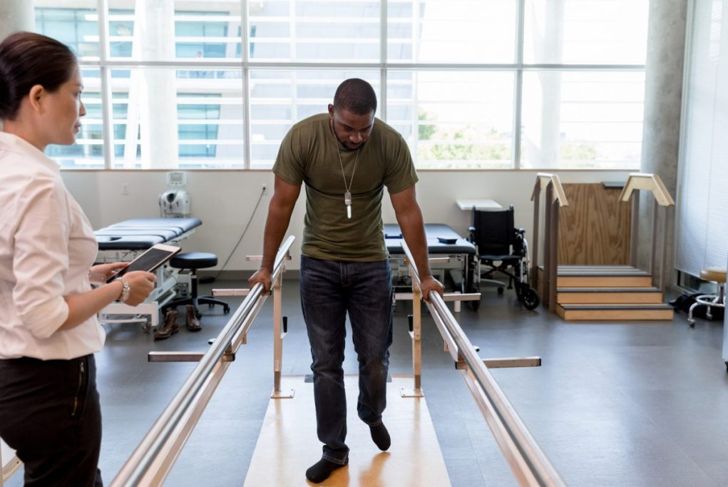Vestibular neuritis or neuronitis is a disorder resulting from inflammation affecting the vestibular nerve of the inner ear. This nerve carries information about head position and balance to the brain. As a result, most of the symptoms of vestibular neuritis affect balance. The issue can resolve in a matter of weeks, or it may become chronic. Many people also use the term “labyrinthitis” to refer to vestibular neuritis, though there are differences between the two conditions.
Causes
Vestibular neuritis develops when an infection causes inflammation of the vestibular nerve. Usually, these infections begin as sore throats, colds, or the flu, mostly stemming from a virus, though a bacterial infection can also be responsible. Middle ear infections or meningitis, for instance, can lead to vestibular neuritis. Head injuries can also allow bacteria to travel into the inner ear.
Symptoms
Vertigo is the main symptom of chronic neuritis; it causes the affected individual to feel as though their body or the environment is moving. Most people experience a spinning sensation, though some feel like they are being pulled to one side. Nausea and vomiting are common side effects of extreme vertigo. Some people also have nystagmus, a condition that causes the eyes to make repetitive and uncontrollable movements. Nystagmus often causes a person to nod or move their head to compensate for this motion.
Labyrinthitis
Many people use the terms “vestibular neuritis” and “labyrinthitis” interchangeably, but this is inaccurate. While both issues affect the nerves of the inner ear and begin as infections, they have some key differences. Both conditions can cause vertigo, but labyrinthitis often affects hearing as well. Some individuals experience a level of hearing loss, while others develop tinnitus.
Acute Neuritis
Vestibular neuritis is typically an acute condition, meaning that the symptoms develop quickly and it does not recur after treatment. Many people report feeling suddenly dizzy in the middle of the day, while otherwise feeling normal. If the inflammation worsens at night, the symptoms may manifest right after waking. Most cases resolve from several days to a few weeks after symptoms begin.
Chronic Issues
It is possible for vestibular neuritis to permanently damage the vestibular nerve. This can cause constant or recurring dizziness long after the other symptoms have ended. It can be difficult for people with chronic vestibular neuritis to describe their symptoms. They often look healthy and cannot understand why they don’t feel well. Everyday actions and activities become more tiring, difficult, and uncomfortable. Often, they experience a persistent feeling of haziness or difficulty concentrating.
Diagnosis
A large number of ear and eye-related conditions can cause vertigo, so doctors must carry out a physical exam to diagnose vestibular neuritis and rule out other disorders. During the exam, the physician usually asks the patient to move their head or body in specific ways, to test balance and equilibrium and to check for signs of inflammation and infection. It may also be necessary to observe the eyes for movements that might hint at vestibular nerve inflammation.
Short Term Treatment for Vestibular Neuritis
Many people do not require any treatment for vestibular neuritis because the condition resolves itself within a few weeks. Some doctors choose to prescribe medications to inhibit the signals coming from the vestibular nerve or antiemetics to help with nausea and vomiting, as well as antibiotics if a bacterial infection is responsible. Individuals with persistent vomiting may require an IV to prevent dehydration.
Long Term Treatment
If a person has chronic vestibular neuritis, treatment is more complex. Doctors will first need to confirm damage to the vestibular nerve using electronystagmography or videonystagmography, tests that track eye movements to detect balance issues and nerve damage. If physicians detect chronic symptoms, they refer the patient to a specialized physical therapist for vestibular rehabilitation exercises designed to retrain the brain to compensate for balance issues.
Balance Rehabilitation
To begin vestibular rehabilitation, physical therapists evaluate the individual’s balance and the location of their center of gravity. Many of the exercises that help with rehabilitating balance are simple enough to be performed at home. Therapists will continue to monitor and modify the exercises as balance improves. Rehabilitation may occur quickly, or it may take several weeks for the effects to become noticeable. Some individuals need to continue the exercises for years to maintain proper balance and function.
Outlook
Though vestibular neuritis often feels serious, it is rarely a dangerous condition. Most people make a full recovery in a matter of weeks. Those who develop chronic vestibular neuritis can reduce their dizziness using exercises. They can often completely overcome the damage to their vestibular nerve. However, in the short term, the balance issues and dizziness make everyday activities troublesome. This requires understanding from friends, family, and supervisors. Additionally, it may be necessary to avoid busy or vibrant places, such as stores or busy streets, until rehabilitation is complete.

 Home
Home Health
Health Diet & Nutrition
Diet & Nutrition Living Well
Living Well More
More




















